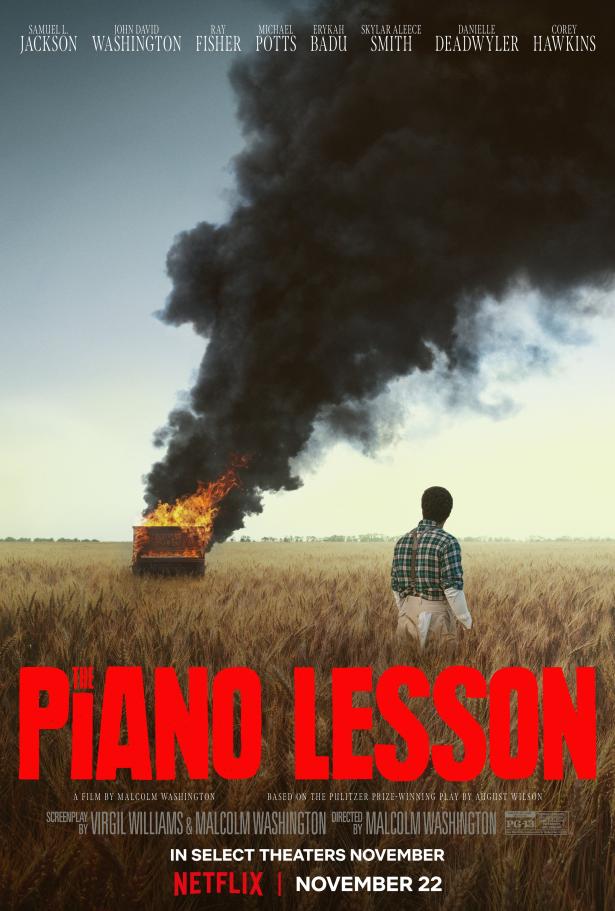Riddle me this: When is a piano not merely a piano? Answer: In “The Piano Lesson,” where one piano contains a whole world.
A whole family’s world, anyhow. The piano in question is an old upright, carved all over with the faces and figures of departed ancestors and stolen from the white Mississippi man who once enslaved members of this family. For Berniece (Danielle Deadwyler), that means it’s sacred, a link to past trauma and resilience that must be preserved.
For her brother, Boy Willie (John David Washington), the piano represents something else: money. More precisely, when he looks at the piano he sees the cash he needs to buy a piece of land back home in Mississippi and set up his own farm. That’s why he’s traveled up here to Pittsburgh, where Berniece lives with her daughter, Maretha (Skylar Aleece Smith), and an uncle, Doaker Charles (Samuel L. Jackson). Ostensibly Boy Willie has come to sell watermelons to locals with his friend Lymon (Ray Fisher). But it’s the piano he’s after.
To others, the piano means other things. For Avery (Corey Hawkins), an elevator operator who dreams of starting a church and marrying Berniece, the piano offers the possibility of a stable future. But for Doaker Charles’s brother Wining Boy (Michael Potts), the instrument is a reminder of the exhilarating, unrelenting life he once lived on the road as a successful pianist, before he became washed up and broke.
There was a previous movie adaptation of “The Piano Lesson” in 1995, made for television and starring much of the original Broadway cast. This one is the third installment in a pledge made by Denzel Washington — the father of both John David Washington and the film’s director, Malcolm Washington, who wrote the screenplay with Virgil Williams — to produce the whole Pittsburgh Cycle as movies. (The previous two installments were “Fences,” from 2016, in which the elder Washington starred and directed, and “Ma Rainey’s Black Bottom,” which was released in 2020.)
Set in 1936, “The Piano Lesson” is, like all of Wilson’s work, dependent on well-chosen symbols while simultaneously loaded with the lived-in dialogue and banter that makes it feel as if we’ve just stumbled into an ongoing story. And indeed, we have. The point of “The Piano Lesson” is not this one family, but its place in many generations of history. The faces and figures on the piano were carved by Berniece and Willie’s great-grandfather, whose own wife and son were sold by Sutter, their enslaver, to buy the piano for his wife. Later, Willie and Berniece’s father stole the piano from the Sutters, and paid for it with his life. This is a history of violence and wounds.
In the play, this history is discussed by the characters, but not depicted, the result being that those in the audience create the scene in their heads. In that way, the audience members take on those memories as if they’re their own, fashioning them from images and imaginations and perhaps their own history.
The more literal medium of cinema offers ways to create those scenes for the audience, and so the director elects to do so. In Malcolm Washington’s film, full-scene flashbacks appear as well as more impressionistic slices, as if recalled collectively from some inherited memory. Other events left offstage in the play — such as when Willie and Lymon go out to woo some local women — are shot here as well. And while the play takes place entirely inside Doaker Charles’s house, the film begins and ends in Mississippi, showing us what happened before these events and what will happen next.
The result is not entirely satisfactory. Leaving less to the imagination sets the Charles family story at more of a distance from the audience, as if their story is their story, and not ours too. These characters are people, with cadences and quirks and desires, but they’re also stand-ins for the myriad ways that Wilson saw formerly enslaved Americans grappling with the past and the future: Berniece with her painful reverence, Doaker Charles with his measured ambivalence, Wining Boy with his dissipation, Willie with his full-steam headlong drive to prove himself equal to the white men around him down South. They’re types and real people all at once, and the text asks us to connect on both levels; the movie doesn’t quite let the metaphors surface.
That’s nowhere more evident than near the end of the film, which, like the 2022 Broadway revival, turns the lurking idea of ghosts haunting the piano from the more figurative — ghosts lurk in America, especially in Black families — into something quite literal. This is Washington’s debut feature, and his directorial eye is not quite up to the raucous staging this requires; it turns choppy and the rhythm is off.
What’s great about the movie is its performances. John David Washington brings fire to his role, matched by Deadwyler’s coolly furious resolve. Jackson’s role has him mostly observing, but he’s a magnetic presence. And Fisher is phenomenal, embodying a character who seems oblivious and a little dense but, it turns out, is more than meets the eye.
Still, as a film, “The Piano Lesson” is the weakest of the Denzel Washington-produced Pittsburgh Cycle. But when you’re working with Wilson’s material, there’s an inherent richness, and the questions this film raises have never been more potent. What do we do with our past? What does it mean to face the future? And when every ordinary day in a nation is littered with reminders of a history that’s never been resolved, how do we live? “The Piano Lesson” presents a ghost-haunted world with few answers to these questions. To grapple with them, we first have to listen.
The Piano Lesson
Rated PG-13 for scenes of trauma and violence, some language, and some ghosts. Running time: 2 hours 5 minutes. Watch on Netflix.


Spread the word